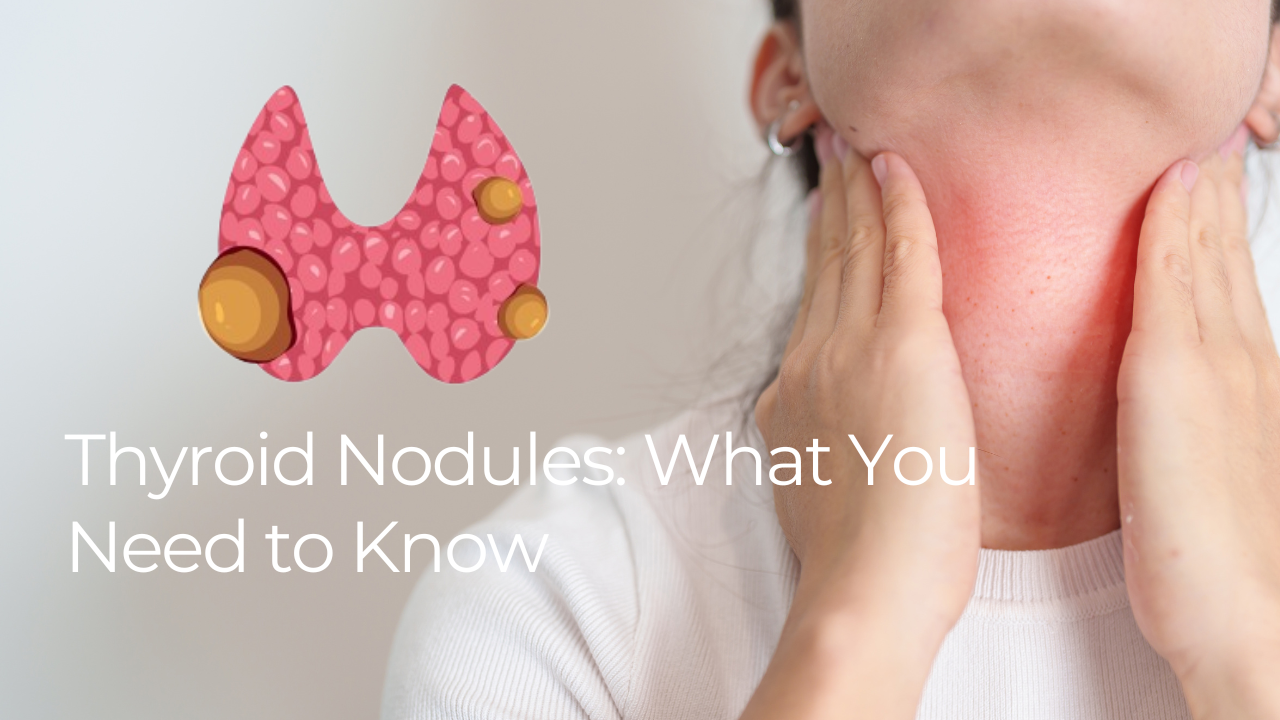Introduction
The thyroid gland, a small, butterfly-shaped organ at the base of your neck, plays a vital role in regulating metabolism and energy levels. Minor lumps or growths known as thyroid nodules occasionally develop within this gland. Thyroid nodules are common in clinical practice, with a prevalence ranging from 3–7% based on physical examination and up to 76% based on thyroid sonography. While most are harmless, some can cause thyroid imbalances or, in rare cases, be cancerous. Understanding their causes, types, diagnosis, and treatment options can help you take control of your thyroid health.
What Causes Thyroid Nodules?
Thyroid nodules can form for various reasons, including:
- Iodine Deficiency: A lack of iodine in the diet can contribute to nodule formation.
- Thyroid Inflammation (Thyroiditis): Conditions such as Hashimoto’s thyroiditis can lead to swelling and nodules.
- Benign Growths: Some nodules are non-cancerous tumors like fluid-filled cysts, or colloid-filled nodules.
- Goiter (Enlarged Thyroid): An overgrown thyroid, often due to hormonal imbalances, may develop nodules.
- Thyroid Cancer: Though rare, some nodules may be malignant or cancerous (up to 5-15%).
- Genetics: A family history of thyroid disorders can increase the likelihood of developing nodules.
Types of Thyroid Nodules
Thyroid nodules vary in form and behavior, including:
- Colloid Nodules: Harmless, fluid-filled nodules that typically require no treatment.
- Follicular Adenomas: Non-cancerous tumors that may sometimes need removal.
- Cystic Nodules: Fluid-filled growths that can change in size over time.
- Inflammatory Nodules: Resulting from thyroid inflammation, these can cause pain or swelling.
- Thyroid Cancer Nodules: Malignant growths that require prompt medical evaluation.
How Are Thyroid Nodules Diagnosed?
To determine whether a thyroid nodule is benign or requires further attention, doctors use several diagnostic tools:
- Physical Examination: A doctor will palpate the thyroid to check for lumps or irregularities.
- Ultrasound Imaging is an especially important investigation that provides a detailed view of the nodule’s size, shape, and structure. It classifies nodules and grade them as benign-looking or at high risk of malignancy.
- Blood Tests: Measures thyroid hormone levels (TSH, T3, T4) to assess gland function and to ascertain if nodules are secreting excess hormone or no.
- Ultrasound Guided Fine-needle aspiration (FNA) Biopsy: Extracts a small tissue sample to check for cancerous cells in a suspected thyroid nodule on Ultrasound.
- Radioactive Iodine Scan or Tecnetium 99 Scan (Tc Scan): In certain cases, this test helps determine whether a nodule is overproducing thyroid hormones, or it is a cold nodule. Hot or cold nodules have different treatment.
Managing Thyroid Nodules
Treatment depends on the size, type, and symptoms of the nodule. Common approaches include:
- Watchful Waiting: Small, asymptomatic benign-looking nodules are often monitored with regular check-ups (every 6,12or24months).
- Medications: Hormone therapy or iodine supplements may help in some cases if nodules are associated with Hashimoto’s Thyroiditis or are mildly toxic.
- Radioactive Iodine Therapy: Used to shrink overactive or toxic or hot nodules or treat specific thyroid cancers post-surgery.
- Minimally Invasive Procedures: Treatments like ethanol ablation or ECHO Laser can reduce benign nodule size to 70-80% without surgery. These are available in specialized centers only but can be tried.
- Surgical Removal: If a nodule is significantly large (more than 3cm), symptomatic, fast-growing, or potentially cancerous, part or all the thyroids may need to be removed.
Conclusion
Thyroid nodules are quite common; fortunately, most pose no serious health risks. However, regular monitoring and early diagnosis are crucial for addressing potential concerns. If you notice neck swelling, persistent hoarseness, difficulty swallowing, or unexplained changes in energy levels, consult an expert Endocrinologist as soon as possible. Taking proactive steps in managing thyroid nodules can provide peace of mind and overall well-being.





